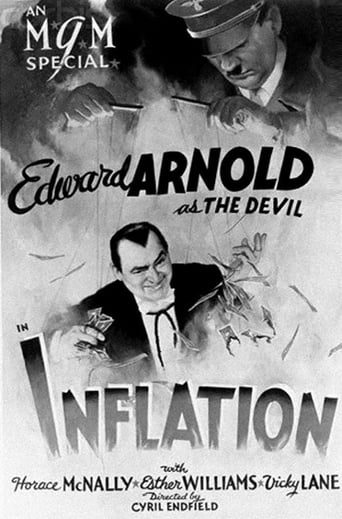



the audience applauded
Overrated
Disturbing yet enthralling
The joyful confection is coated in a sparkly gloss, bright enough to gleam from the darkest, most cynical corners.
View MoreMuch has be written about the use of propaganda by Nazi Germany to control and misinform its citizenry. Inflation is an American short that falls into the same category.Released in 1942, Inflation does not offer rational reasons for recommending certain behavior; it attempts to play on the emotions of the viewer. FDR outlines the unprecedented steps the government is about to take during the early months of WWII to control the U.S. economy. By 1942, the public had become accustomed to his far-reaching and federally-centric approach to public policy while fighting The Depression. The film suggests that another depression is down the road if Americans don't follow his advice.Consistent with other wartime releases, Inflation implies in a very heavy-handed way that anyone who does not comply with Washington's edicts is unpatriotic and, in fact, traitorous. Don't even think about questioning the government's approach. Inflation tells the viewer not to complain.Why? Because if you complain or act contrary to the public message, you might as well consider yourself a killer of American soldiers. Worse, you are in league with the devil. That's right, in this fable with a moral, the primary character is none other than El Diablo himself. And he converses daily with Hitler, of course. Together they plot the downfall of America. Their solution is to convince American citizens to ignore the pleas from Washington, which will cause that most dreaded of all calamaties--Inflation!The acting is intentionally over the top, except for Esther Williams who (in her first film role) plays the wife of a spendthrift jerk who, for some reason, feels compelled to buy! buy! buy! The music is appropriate, providing the ominous strains of violins when The Devil speaks.Looking back at this short film through the intervening years of history (after all the public exposures of government mismanagement and corruption)is interesting. Of course people today still fall victim to empty government promises and its foolish propaganda, especially during war or conflict (remember Freedom Fries? how about the way Mohammad Ali was condemned for following his conscience?) FDR starts with a short and accurate view of wartime realities: military buying produces scarcity in supplies which increases prices. His prescriptions for these economic consequences are sweeping and pervasive (price fixing, taxation, rationing, etc.). Too bad they couldn't rely upon reasoning to convince people. By tweaking the heartstrings of patriotism and invoking a diabolic metaphor, they sell U.S. citizens short. And they do it very well.
View MoreI'm not usually up at 05:30 but this morning [27aug2011] I am and "Inflation" came on. Took me a while to find where it is documented but once I began looking I wasn't ready to give up. Due to the star and subject matter I was sure that someone would have entered something and, sure enough, I finally found it. I started opening titles in the filmography but it just wasn't there. I was about to give up when I read the biography. Its not high art by any means but Edward Arnold is a favorite actor of mine and I'm so glad I had the chance to see this short. I thoroughly enjoyed it, a very well done short on a very timely subject. No spoilers, just a recommendation.
View MoreIn 1933, a propaganda film touting the virtues of inflation, going off the gold standard, and market forces was played in theaters across America. Nine years later, inflation was a tool of the Devil himself, a dark and destructive plot to destroy our country. Amusing how those folks could talk out of both sides of their mouths. Look at these two films back to back, and then consider whether either one's conclusions make sense.P.S.: Canning your own peaches and raising/slaughtering your own meat was/is not hoarding. There were people, Rose Wilder Lane (Laura Wilder's daughter) among them, who never used ration cards/stamps. They took responsibility for themselves AND were able to share with neighbors in need. Just sayin'...
View More"Inflation" was Cy Endfield's first film. It's a 16-minute anti-German propaganda short made for MGM with Edward Arnold as Satan, sitting behind his large CEO's desk and chatting amiably on the phone with Herr Hitler (a framed and signed photo of whom he has displayed) about his plans for destroying the U.S. economy through encouraging people to illegally buy or horded as much unnecessary stuff as they can in defiance of wartime government restrictions. Footage of FDR confirms what all of those complaining about our current government's "socialism" should know: we were a lot closer to it in the 40s than we've ever been since. Price caps? Quotas? Higher taxes, especially on the rich? Short propaganda films like these? Yup, all part of daily life in 1942.There's lots of fun stuff under the surface here. Arnold's v-haircut, his cackling maniacal laughter, and the faky lightning-bolt effects that we see periodically behind him might remind one of Ed Wood films; he's got a sexy secretary (mistress? does the Devil have a mistress?) and indeed the film is full of sex: a sexy housewife (Esther Williams, in her first film role) wants nice dresses and a fur and her hubby seems willing to do anything to get them for her; there's a scene of several attractive young ladies rushing to buy nylons as the prices get hiked. The whole film is over-the-top and feverish, as propaganda films were meant to be, but it's a lot of fun and shows some real wit.
View More